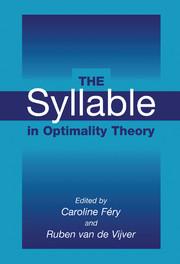Book contents
- Frontmatter
- Contents
- List of Contributors
- Preface
- The Syllable in Optimality Theory
- Part One INTRODUCTION
- 1 Overview
- Part Two SYLLABLE STRUCTURE AND PROSODIC STRUCTURE
- Part Three NONMORAIC SYLLABLES AND SYLLABLE EDGES
- Part Four SEGMENTS AND SYLLABLES
- Part Five HOW CONCRETE IS PHONOTACTICS?
- Author Index
- Languages Index
- Subject Index
1 - Overview
Published online by Cambridge University Press: 03 July 2009
- Frontmatter
- Contents
- List of Contributors
- Preface
- The Syllable in Optimality Theory
- Part One INTRODUCTION
- 1 Overview
- Part Two SYLLABLE STRUCTURE AND PROSODIC STRUCTURE
- Part Three NONMORAIC SYLLABLES AND SYLLABLE EDGES
- Part Four SEGMENTS AND SYLLABLES
- Part Five HOW CONCRETE IS PHONOTACTICS?
- Author Index
- Languages Index
- Subject Index
Summary
The syllable has (nearly) always played a central role in phonological theory, but with the recent advent of Optimality Theory (OT), its role has become crucial. The first papers on OT, as well as numerous papers written since, are based on the syllable. It is no exaggeration to say that syllabification has played a pivotal role in establishing OT and, in turn, that OT has contributed to our understanding of the role of the syllable, since many issues concerning this prosodic constituent have been reconsidered in the light of this theory (McCarthy and Prince 1993, Prince and Smolensky 1993). The present book provides insights into the syllable and into OT in three respects. First, it underlines the continuing interest in the syllable. Second, it shows that OT is capable of providing answers to old issues that have been problematic in procedural analyses, as well as shedding light on new issues and giving fresh perspectives. Third, the syllable helps reveal and solve problems within OT. Several aspects of syllabification have proved hard to solve within OT and have forced phonologists to come up with original solutions.
The first section of this introduction gives an overview of the three issues just mentioned. Since it is impossible to give a detailed account of all the numerous aspects of the syllable that phonologists are concerned with, we focus on the points that we consider as central in the volume.
- Type
- Chapter
- Information
- The Syllable in Optimality Theory , pp. 3 - 20Publisher: Cambridge University PressPrint publication year: 2003



